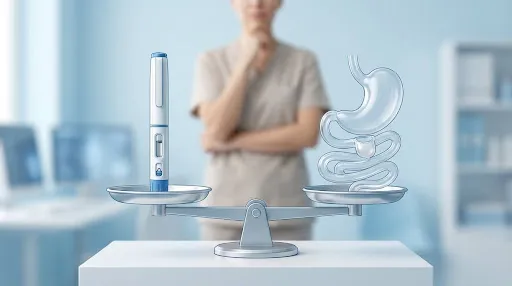Did you know that 20% of Americans deal with chronic pain? If you are also one of them and whether you are experiencing a pounding headache, lingering muscle ache, or post-surgery discomfort, you may wonder, can you take ibuprofen and Tylenol together to get relief? This common question holds more than a simple yes or no—it’s about ensuring safe, effective pain management according to your needs.
Let's find out the details and see what studies say about this popular pain-fighting duo.
Can You Take Ibuprofen and Tylenol Together?
Yes. You can take Ibuprofen and Tylenol Together. However, it's not that easy. These medications work differently in your body. Ibuprofen certainly deals with inflammation while Tylenol deals with all pain signals in your brain. Thus, they can make the pain more bearable.
But you have to be cautious about the dosing and the timings. When taken in excess, it may lead to issues. As a general rule, always begin with the minimum effective dose. If you have doubts, consult your doctor or pharmacist. They will guide you on what is effective for you. What worked for your friend might not apply to you at all.
Benefits of Taking Ibuprofen and Tylenol Together
Mixing ibuprofen and Tylenol can be a game-changer for pain relief. Here's why:
1. Increased Pain Relief
When you take these two medicines together, you're attacking pain from two angles. Ibuprofen deals with inflammation, and Tylenol works on how your brain processes and signals pain. This double-action often works better than using just one medicine. It's like having a dynamic duo fighting your pain.
Many people find this combo more powerful than either medicine alone. This can help with tough pain that doesn't go away with just one medicine.
2. Reduced Side Effects
Using both medicines might actually lower your chance of side effects. Here's how:
- You can use smaller amounts of each drug
- It spreads the work between your liver and kidneys
- You might need pain relief for less time
- You can adjust the mix based on your pain type
- Less ibuprofen means less chance of stomach problems
3. Longer-Lasting Relief
Ibuprofen and Tylenol together can keep the pain away for longer. Ibuprofen usually works for 4-6 hours, while Tylenol can last 4-8 hours. By mixing them up, you can keep pain under control all day. This is great for ongoing pain or after surgery. It helps keep pain away steadily, so it doesn't come back suddenly.
4. Cost-Effective Pain Management
Using ibuprofen and Tylenol together can save you money. Both are available over the counter and often come in cheaper generic forms. This makes them easier to get than some prescription pain medicines. Plus, by combining them, you might need less of each, so they last longer.
It's a smart way to manage pain without spending too much. Just remember, always put safety first when it comes to medications.
How to Safely Combine Ibuprofen and Tylenol
To mix ibuprofen and Tylenol safely, you need to know a few things.
-
First, always start with the lowest dose that works. A common way is to take the normal dose of one, then add a smaller dose of the other if you need it. For adults, this might mean 400mg of ibuprofen with 500mg of Tylenol.
-
Wait at least 2-3 hours between doses. Never take more than the max daily dose of either medication.
-
Keep track of what you've taken and when. It's easy to lose count, especially when you're hurting. Maybe use a medication-tracking app or a simple notebook.
If you're taking other medicines, check with your pharmacist to avoid any bad interactions. Remember, don't use this combo for a long time without talking to your doctor.
Potential Side Effects of Taking Ibuprofen and Tylenol Together
While mixing ibuprofen and Tylenol can work well, it's not without risks. Here's what to watch out for:
- Stomach irritation or ulcers
- Higher chance of bleeding, especially in your gut
- Liver damage if you take too much Tylenol
- Kidney problems, especially if you use it for a long time
- Higher blood pressure
- Allergic reactions, though these are rare
- Headaches from using too much medication
- Feeling dizzy or lightheaded
- Feeling sick or throwing up
- Skin rashes or itching
Who Should Avoid This Combination?
Not everyone should mix ibuprofen and Tylenol. Here's who should be careful or avoid this combo:
- People who've had stomach ulcers or bleeding problems
- Those with liver disease or who drink a lot of alcohol
- People with kidney problems
- Patients taking blood thinners
- Those with high blood pressure
- Pregnant women, especially in the last three months
- People with asthma who react badly to NSAIDs
- Those taking certain antidepressants
- People with heart disease or who've had heart attacks
- Anyone allergic to either medicine
How to Talk to Your Pharmacist About Pain Relief
Talking to your pharmacist about pain relief is super important. Here's how to do it:
- Tell them what kind of pain you have and how bad it is
- Mention any health conditions you have
- List all the medicines you're taking
- Ask about how different drugs might interact
- Find out about the right doses and when to take them
- Talk about any worries or side effects you're concerned about
When to See a Doctor
While ibuprofen and Tylenol can provide effective pain relief, there are times when professional medical advice is crucial. Contact your doctor if:
- Pain Persists: Your pain doesn’t improve after a few days of using these medications.
- Severe Side Effects Occur: Symptoms like nausea, vomiting, stomach pain, dizziness, or allergic reactions (e.g., rash or swelling) arise.
- Fever Lasts More Than 3 Days: This could indicate an underlying issue that needs attention.
- Underlying Conditions: You have chronic health issues like liver, kidney, or heart disease, or you're pregnant.
- Pain is Unusual or Sudden: Especially if it’s severe and has no clear cause.
- You’ve Taken Too Much Medication: Overdosing on either drug requires immediate medical attention.
Your doctor can provide personalized guidance, adjust your treatment plan, and check for any conditions that might be causing your pain. When in doubt, always prioritize professional advice.
Final Thoughts
So, can you take ibuprofen and Tylenol together? Yes, but always be careful and know what you're doing. This combo can help with pain when used correctly. But it's not a one-size-fits-all solution. Always talk to a doctor or pharmacist before starting any new pain relief plan. They can give you advice that's right for your specific health needs.
Don't forget to share this info with friends and family who might find it helpful. Your health is super important – treat it that way!
Frequently Asked Questions
How long should I wait between ibuprofen and Tylenol?
Wait at least 2-3 hours between doses to avoid overloading your system
Can I use this combo for fever?
Yes, it can help with fever, but follow dosage guidelines and talk to a doctor if fever persists.
Is it safe to take them together daily?
Regular, long-term use isn't recommended without a doctor's okay due to potential side effects.
Can kids take ibuprofen and Tylenol together?
Kids can, but doses must be based on weight. Always ask a pediatrician first.
What's the max daily dose when combining them?
For adults, generally no more than 3200mg ibuprofen and 4000mg Tylenol per day, but lower doses often work.
How do I know if I'm having side effects?
Watch for stomach pain, nausea, dizziness, or unusual bleeding. If you notice these, stop taking the medicines and call a doctor right away.
Reviewed by







